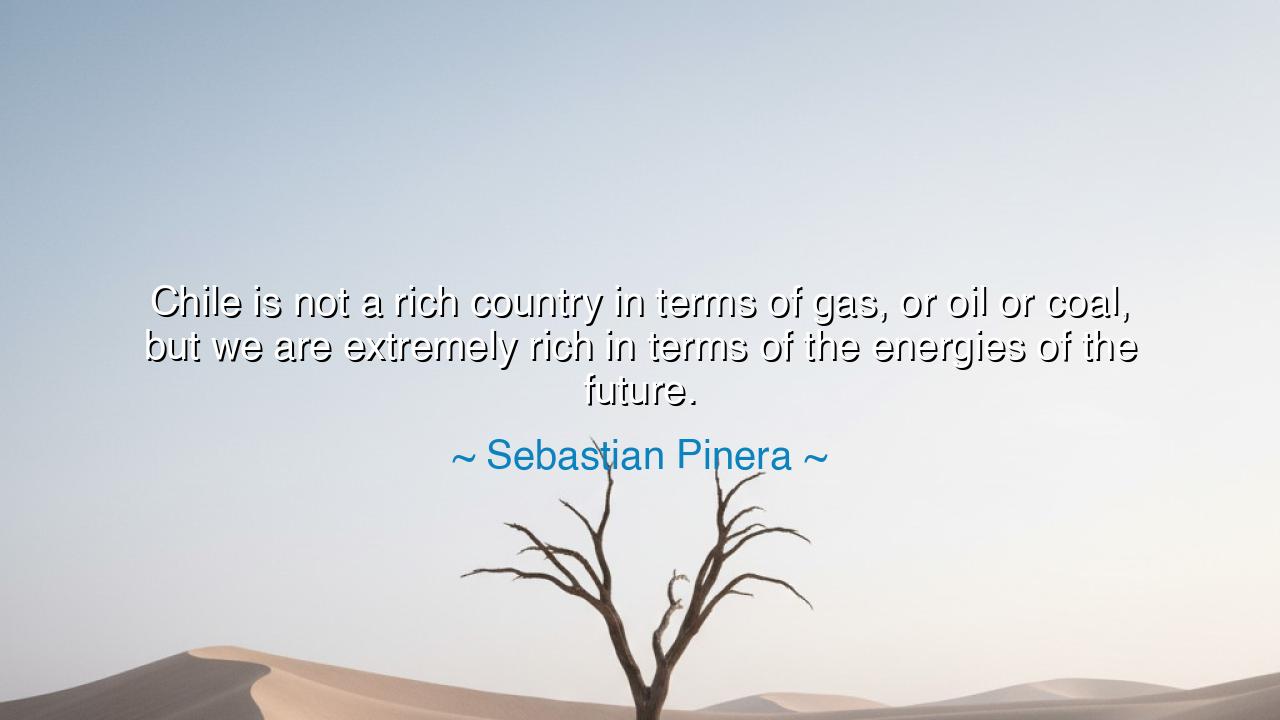
Chile is not a rich country in terms of gas, or oil or coal, but
Chile is not a rich country in terms of gas, or oil or coal, but we are extremely rich in terms of the energies of the future.






Hear now, O Seekers of Truth, the words of Sebastian Piñera, who speaks to the heart of a nation's potential, not through the accumulation of material wealth, but through the unseen forces that shape the future. He said, "Chile is not a rich country in terms of gas, or oil, or coal, but we are extremely rich in terms of the energies of the future." In these words lies a powerful truth about the nature of resources and progress—that true wealth is not always found in what we possess today, but in what we can harness tomorrow. The energies of the future are not bound to the oil fields or coal mines of the past, but to the innovations and sustainable forces that will shape the world to come.
In the ancient world, civilizations rose not just by exploiting the resources at their feet, but by understanding the forces of nature that they could shape and transform. Consider the Greeks, who, though not rich in natural resources like gold or silver, were incredibly wealthy in terms of intellectual energy and innovation. It was their mastery of thought, philosophy, and the pursuit of knowledge that allowed their society to flourish and leave a lasting legacy. Piñera’s words echo this sentiment: Chile may not have the traditional resources that others boast of, but it is rich in the forces of the future—forces like renewable energy, sustainable practices, and the potential for technological advancement.
The energies of the future that Piñera speaks of are the winds of change—the sun, the wind, the tides of the oceans, and the very force of human ingenuity. In the ancient times, civilizations that thrived were those who learned to adapt, to harness what nature had to offer and to use that to propel them forward. The ancient Egyptians, for instance, built great structures not by relying on untapped reserves of precious metals, but by mastering the power of the Nile River—using its floods to fertilize the land, to create abundance where none existed. Similarly, the Romans mastered the forces of water with their aqueducts, channeling it to sustain their cities, ensuring both survival and prosperity.
In the modern age, Chile's wealth lies in its potential for clean, renewable energy. The vast, sun-drenched deserts of the Atacama, with some of the highest solar radiation in the world, are a beacon of promise. The wind sweeping across the Patagonian plains holds the potential to power entire cities. These are not resources buried deep within the earth, to be mined and exploited, but forces that are abundant, sustainable, and capable of propelling a nation into the future. As Piñera points out, this is the true wealth—an energy that is both a natural gift and a tool of progress.
Just as the ancient Greeks and Romans used the resources at their disposal to build civilizations that would shape the world, so too must modern nations like Chile recognize the unique power they possess in renewable energies. This is not a wealth that can be squandered, nor one that will run out with time. Unlike oil or coal, which are finite and polluting, the energies of the future—solar, wind, tidal—are inexhaustible and clean. They are the very lifeblood of progress, capable of sustaining both the people of Chile and the world for generations to come.
The lesson of Piñera's words is one of vision—understanding that true wealth is not always immediate, but often lies in the long-term potential of a nation, a people, or a planet. The ancient philosophers understood that the mind’s power was not always immediately apparent, but its influence would extend through time. Similarly, the resources of today—like oil or coal—may seem to be the most obvious measure of wealth, but the future wealth lies in the sustainable, renewable forces that will allow future generations to thrive. Chile, with its abundant natural resources of wind and sun, stands at the threshold of a new age, one where it can lead the world into a future of clean energy.
Thus, O Seekers, let us take Piñera's message to heart. In our own lives, we must learn to look beyond immediate wealth and consider the potential of the future. The greatest treasures are not always what we hold in our hands today, but the possibilities that lie ahead. Just as the ancient civilizations built legacies not just from their resources, but from their ability to adapt and innovate, so too must we recognize the energies of the future—the sustainable forces, the potential for growth, and the power of our collective ingenuity. In doing so, we will shape a future not only for ourselves but for generations to come, a future rich in the energies of tomorrow.






AAdministratorAdministrator
Welcome, honored guests. Please leave a comment, we will respond soon